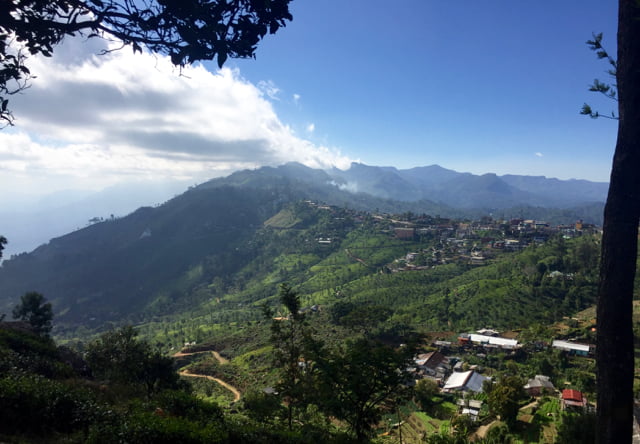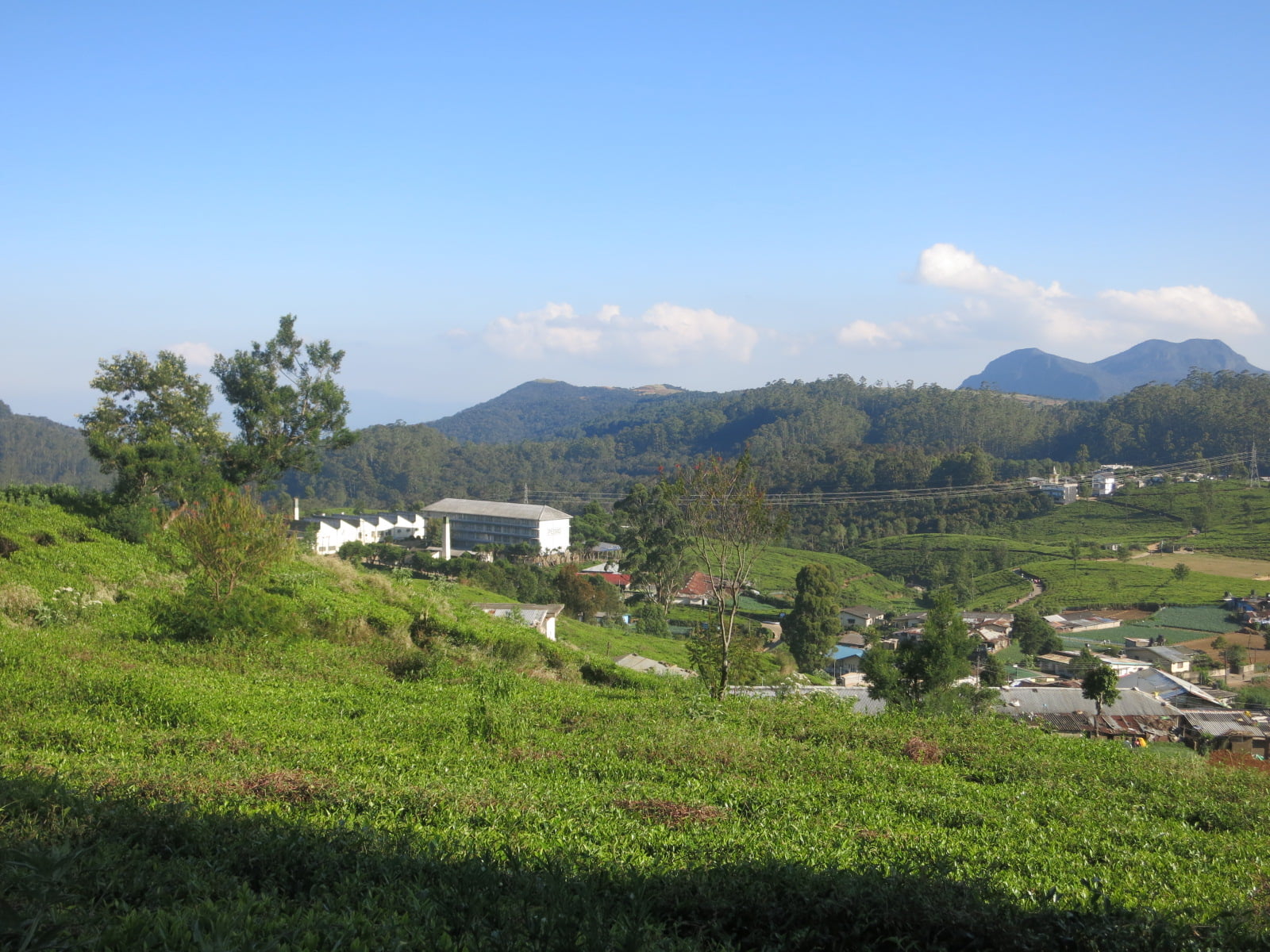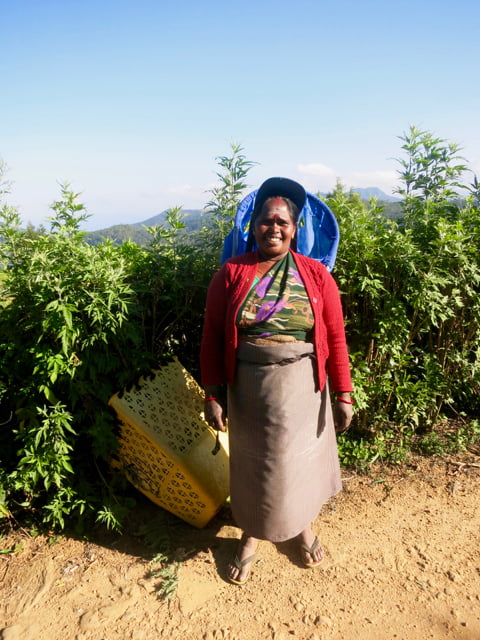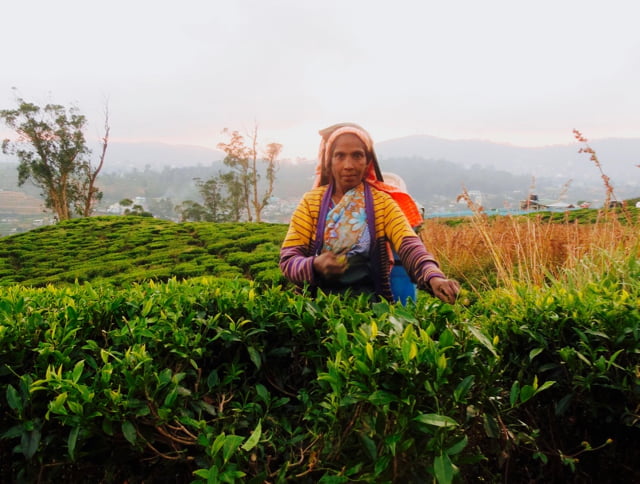1.
“Come have a meal,” boomed the man inside the shop. “It’s free.” I looked up from the papayas on display on the shutter board that hung from the storefront. The fruits looked tempting, after many days of rice and curry. The man inviting me in did not. “Thank you,” I said to him, “I just had lunch.” This was true. I only wanted papaya. But the man insisted, gestured impatiently, underlined the fact that this was about food and it was free. He didn’t see any reason why I should not come in.
Frankly, I did. Sri Lanka is a poor country, and the village perched upon the southern edge of the hill country escarpment seemed to belong to the poorest parts of it. The flanks of the hills are covered in tea plantations, where tea pickers go about their job in exchange for nothing but a dollar or two each long, hot day. Why would anyone go around giving me free food, me, the immeasurably rich visitor from the west?
Maybe that was the point, I mused, as I walked away, ignoring the man’s continuing invitations, and the shouts of some schoolboys sitting on the side of the roads (“Hello!” and “free food, mister”). Maybe he wanted to lure me in, knock me out and steal whatever I was carrying. Had not my mother warned me never to take anything from strangers? Was there such a thing as a free lunch? Right.

I walked through the village, looking for a way to get to the summit of the mountain that was looming over it. Straight up was not an option, because of the steep ascent and the sheer cliff toward the top, but the road along the flank of the escarpment seemed promising. Maybe I could find a path through the tea plantations there.
As I went, the thought of this free meal kept rumbling in the back of my mind. Why had I refused it? Why was my first reaction always fear, and why did I stick to that? It was February 2016, almost a year had passed since I left the Netherlands in search of adventure and personal growth. In moments like this, it seemed like nothing had changed in all these months. Still, fear and narrow-mindedness were guiding my actions.
2.
A car the size of a modest battleship pulled up next to me. The tinted window rolling down revealed a middle-aged Sri Lankan man. “Where a-going,” he asked, in the same Lankan English the legions of tuktuk drivers deployed, cheerful, prying, annoying as fuck. I answered as I always did, “that way”, pointing in the general direction I was going. Then it dawned on me that this might be my chance to make amends with my adventurism. “Get in,” he said, “I give you a ride.” So I did.

This man was not a tuktuk driver, but a businessman from Colombo. His car cost more than five tuktuk drivers would make in their lifetimes, and he had driven it here to spend a long weekend in a nearby tea estate. I should come and see, he said, it’s beautiful. I refused: there was not much time left till sunset. “Look,” he said, pointing down the slope, “there it is.” A bunch of corrugated iron roofs lay scattered about a dusty plot of land. He repeated his invitation. “I think I see a way up,” I said. “Please let me out.” But he drove on. The fear rose again. At the turnoff to the estate, he stopped to let me out.
From here, there wasn’t a way up either. The tea plantations continued three quarters of the way, but after that, the slope got too steep to grow tea anymore, which means: too steep to walk. It was covered in dense cloud forest, too. To hell with it, I said to myself, and walked back along the road I came, along a cascade of green all the way down the slope into the undulating plains toward the southern coasts and the ocean beyond.
I took my sweet time walking back, taking in the views from every bend in the road toward the town. It seemed to be sliding off the rim or climbing up it, however you want it. Clouds whirled around the peaks on the other side of the pass. An age-old rustbucket of a bus chugged past, billowing black smoke. It was packed with gaunt, dark skinned people in colourful clothes: ‘Plantation Tamils’, descendants of people the British drafted from South India to work the plantations for far lower wages than the local Singalese population ever would. Little has changed since then; the tea pickers are slaves in all but name.

To reach my guesthouse from the centre of town, I had the choice between walking along the main road. As all roads in Sri Lanka, it was shrouded in smoke that was often ripped apart by wailing horns and roaring engines. Local drivers, bus drivers especially, are always racing in a continuous effort to make it to the top of the list of the most suicidal, brutal drivers of the planet. So I preferred the other option, the dead-end road to the train station, from where I would have to pass through a hole in the fence onto the railway tracks. This was a completely normal way for pedestrians to travel, quite comfortable because of the lack of steep gradients, even though you sometimes had to hop from one sleeper to the next. A dozen trains passed every day, and each could be heard from miles away, sounding their terrifying horns with only brief pauses in between.
3.
In order to reach the tracks, I had to pass the shop again. This time, I would be brave and see what was in store for me. But as I approached, nobody came out to invite me to any lunches, free or not. I examined the papayas again for much longer than was needed. At last, I picked one, and entered the dark, musty shack. The shopkeeper was a sullen, timid man, looking twice as old as his age. The bags under his eyes gave his face an expression as if he was incredibly sorry for something.
He weighed the papaya. It was just under a kilogram. “35 rupees,” he said. That’s less than 25 cents. Maybe he felt sorry for being desperately poor, I thought. I pointed at some roasted chick peas. Those went for 10 rupees per bag; I took two, intent on spending at least 100 rupees here, less than a dollar still. Two schoolboys appeared, shouting “Hello!” at me and giggling when I answered, in English and Sinhalese. I told them to each pick a sweet from one of the containers on the counter. They hesitated: their mother, too, must have warned them about taking things from strangers.

As I paid the shopkeeper, a door opened in the dark back of the shack, and the man offering free food appeared. He was tall for a Sri Lankan, and even bulkier than most of his adult countrymen. The shop seemed full at once. “You came back”, he cried joyfully. “Are you hungry now?” I nodded, but did not want to make it too easy for him. “Why are you handing out free food,” I asked. “Come,” he said, leading me through the door into a low, square room, lit by several neon tubes.
The walls were covered in colourful pictures of the Buddha and a few Hindu deities, covering up damp and mouldy walls. A leather couch and some comfortable chairs, gathered around a low table, took up most of the space. All furniture was covered in plastic. In one of the chairs sat a man, another just came in through the other door. No one was eating. “Sit,” my host said, and I did, but as he started introducing the others, I had to get up again to shake their hands. My palms were damp.
The man in the chair was introduced as Paul, the other as Baby. This was a nickname, I was to understand, and they called him that because he lost all his teeth but one to chewing betel. My host introduced himself as Ali. “Yes, Ali,” he said, “I am a Muslim, Paul is a Christian and Baby is a Buddhist. And look: we are all friends. We are like brothers!” His eyes bulged once more. “You see, faith is not important. All religions are about the same thing: love other people, and share what you have.” Is that why you give away free food, I asked. “Of course,” he said. “Money is nothing, but food is essential. So I give out free food.”
4.
Paul smiled at me from across the room, and said: “Our uncle has died.” I frowned. What a strange remark. I muttered some condolences. Ali burst out: “Yes! That’s why! It is custom in our society to give out free food seven days after death, and then one month later, and then a year later. Food is essential,” he affirmed once more. Baby came out and brought me a big plate of rice with five curries around it. It didn’t look all that essential, but rather a bit bland and overcooked, yet it tasted delicious.
Ali rattled on about the joys of friendship, as Paul answered his phone. In reaction to whatever he was saying in Sinhalese, the room fell silent. After Paul hung up, everyone started talking at the same time. Then, the others went out, while just Ali and me remained. They went to talk to the police, he said. Paul was a tuktuk driver, but to observe his mourning duties, his son now ran his business. Some officer didn’t agree with this idea, citing the age of the 14 year old as unfit for driving paying passengers around. Ali was sure that such pettiness could easily be resolved. “A good talk will smooth things over,” he said. I could hear some quotation marks around this ’talk’, but since money is not essential, neither was explaining that his friends would bribe the boy out of custody.

My host was not easily distracted, so he picked up on his theme immediately. He asked me how old I thought he was. I stayed on the safe side and said 40. He burst out laughing, saying he was 59. “But I’m still sexy,” he said, “many women in the village fancy me. You know why? Because I give away everything I have, and I laugh a lot.”
A man entered the room. Ali introduced him as a cousin named Aziz, a Muslim just like him. Here, my host picked up on the religious theme again: everyone should live as one, because all holy scriptures say essentially the same things. “All faiths say that you should honour your parents,” Ali said. “That is very important. I go to my mother three times a week. I lie in her bed and she strokes my hair and I fall asleep. I love my mother very much.” Here, the big man Ali, 59 but still sexy and in high demand with the ladies, burst into tears.
I finished my food. Ali wiped his eyes. Aziz reached behind his seat and produced a glass bottle with not much left in it. “You want a drink?” I asked what it was. “Arrack,” he said, “home brewed. We have been drinking all day. Well, I’m a Muslim, so just one glass for me.” He winked. I looked at Ali, his bulging eyes, now red from crying, his gestures, his torrential speech about love and unity. Ali looked back. “Have you finished?” I nodded, mumbling that it had been delicious. “Good,” he said, in a brisk tone. “Let’s go out now.” Outside, he shook my hand, said a short farewell and took off in the direction of town, his gait a little loose perhaps, maybe on his way to a woman who fancied him, maybe to his mother to have his hair stroked, and the afternoon sun washed everything in a rich golden patina.

